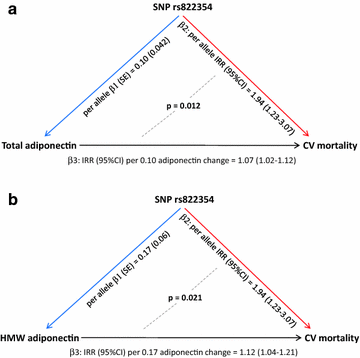Evidence of a causal relationship between high serum adiponectin levels and increased cardiovascular mortality rate in patients with type 2 diabetes
- PMID: 26817832
- PMCID: PMC4730617
- DOI: 10.1186/s12933-016-0339-z
Evidence of a causal relationship between high serum adiponectin levels and increased cardiovascular mortality rate in patients with type 2 diabetes
Abstract
Background: Despite its beneficial role on insulin resistance and atherosclerosis, adiponectin has been repeatedly reported as an independent positive predictor of cardiovascular mortality.
Methods: A Mendelian randomization approach was used, in order to evaluate whether such counterintuitive association recognizes a cause-effect relationship. To this purpose, single nucleotide polymorphism rs822354 in the ADIPOQ locus which has been previously associated with serum adiponectin at genome-wide level, was used as an instrument variable. Our investigation was carried out in the Gargano Heart Study-prospective design, comprising 356 patients with type 2 diabetes, in whom both total and high molecular weight (HMW) adiponectin were measured and cardiovascular mortality was recorded (mean follow-up = 5.4 ± 2.5 years; 58 events/1922 person-year).
Results: The A allele of rs822354 was associated with both total and HMW adiponectin [β (SE) = 0.10 (0.042), p = 0.014 and 0.17 (0.06), p = 0.003; respectively]. In a Poisson model comprising age, sex, smoking habits, BMI, HbA1c, total cholesterol, HDL-cholesterol, triglycerides, insulin therapy and hypertension, both rs822354 (IRR = 1.94, 95 % CI 1.23-3.07; p = 0.005), as well as the genetic equivalent of total adiponectin change (IRR = 1.07, 95 % CI 1.02-1.12; p = 0.003) were significantly associated with cardiovascular mortality. The observed genetic effect was significantly greater than that exerted by the genetic equivalent change of serum adiponectin (p for IRR heterogeneity = 0.012). In the above-mentioned adjusted model, very similar results were obtained when HMW, rather than total, adiponectin was used as the exposure variable of interest.
Conclusions: Our data suggest that the paradoxical association between high serum adiponectin levels and increased cardiovascular mortality rate is based on a cause-effect relationship, thus pointing to an unexpected deleterious role of adiponectin action/metabolism on atherosclerotic processes.
Figures

References
Publication types
MeSH terms
Substances
LinkOut - more resources
Full Text Sources
Other Literature Sources
Medical
Miscellaneous

